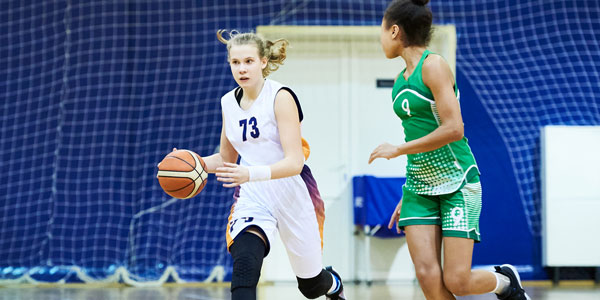Helping Kids Look at Pressure as an Opportunity
What causes choking? Why do some young athletes choke while other athletes rise to the occasion?
Most young athletes don’t like to hear the word “choking,” let alone admit that they choke. Yet, some athletes believe they “always choke” when the pressure is on.
Choking generally results from kids dealing with three issues.
The first is negative self-talk. If kids tell themselves they will choke over and over or refer to themselves as chokers, they will likely choke when the pressure is on.
Self-talk is powerful. Think of self-talk as a directive. Kids’ self-talk tells them what to do, how to do it, and when to do it.
For example, a young athlete might say, “In the last minutes of a close basketball game (when to do it), I always choke (what to do) and shoot the ball short (how to do it).”
Athletes should send themselves a different message to yield different results. For example, they might tell themselves, “When my legs get tired, make sure I get my legs into the shot and follow-through.” During games, it’s ideal to shorten this message by using cue words such as legs and follow-through.
Second, kids’ perspective is critical. When they view pressure situations as an opportunity to fail or embarrass themselves, they will tense up and play it safe.
In the ninth inning of a tied baseball game, if they see themselves as “chokers,” they will try to avoid striking out instead of swinging the bat and making solid contact.
Young athletes are more successful when they see challenging situations as a chance to shine and help their teams.
A third issue that leads to choking relates to what kids focus on. Concentrating on results, the outcome of a gymnastics routine, missing a game-winning shot or losing a set in a tennis match all create anxiety. And anxiety negatively affects sports kids’ physiology and mechanics, causing them to choke.
Kids need to stay immersed in what they are doing to keep their attention on the moment, freeing their minds and bodies to just perform.
Choking or performing under pressure directly results from kids’ perspective, focus and self-messaging, all of which are under kids’ control. Be sure to remind sports kids that they have control of these three issues.
Boston Celtics head coach Ime Udoka talked about how his team needs to respond to adversity:
“It’s guys getting rattled when it’s not the end of the world. You still have a 12-point, comfortable lead, and you gotta end that run,” he said. “We have to understand time and score, and we need a solid shot and not just get caught up in the game.”
Blowing a big lead is often due to choking or playing it too safe. The fear of unraveling and losing after having a commanding lead causes athletes to play cautiously and on their heels, instead of on their toes.
The focus always needs to be on the present moment. Kids will underperform or choke when their minds drift away from the moment at hand.
One way for kids to prevent choking is to reframe how they view pressure games. For top athletes, pressure elevates their game when they use the added intensity to go deeper into the zone.
Help kids look at pressure as an opportunity to excel, not an opportunity to fail.
Under pressure, the game is the same with the same size court, rink, or field. The only thing that changes is young athletes’ perspective of the importance of the game!
Related Articles on Kids’ Mental Game:
- Is Your Sports Kid a Gamer or Choker?
- Why Do Athletes Choke Under Pressure?
- How Choking Hurts Athletes’ Performance
*Subscribe to The Sports Psychology Podcast on iTunes
*Subscribe to The Sports Psychology Podcast on Spotify
Improve Your Mental Game From Anywhere In The World

We’re certain that, as a parent, you want to help your child develop confidence and discipline in sports and life. And as a sports parent, you’d love for your children to reach their potential in sports. But encouraging your child to strive for greatness without pressuring them can be a challenge.
You can get expert mental coaching with us from anywhere. Meet with us via Zoom, Skype, FaceTime or phone call. With today’s video technology, we are able to connect with athletes and coaches all over the globe.
Call Us Today to Schedule Your Free 15-Minute Session.
Find Out How Your Athlete Can Benefit From One-on-One Mental Coaching!

